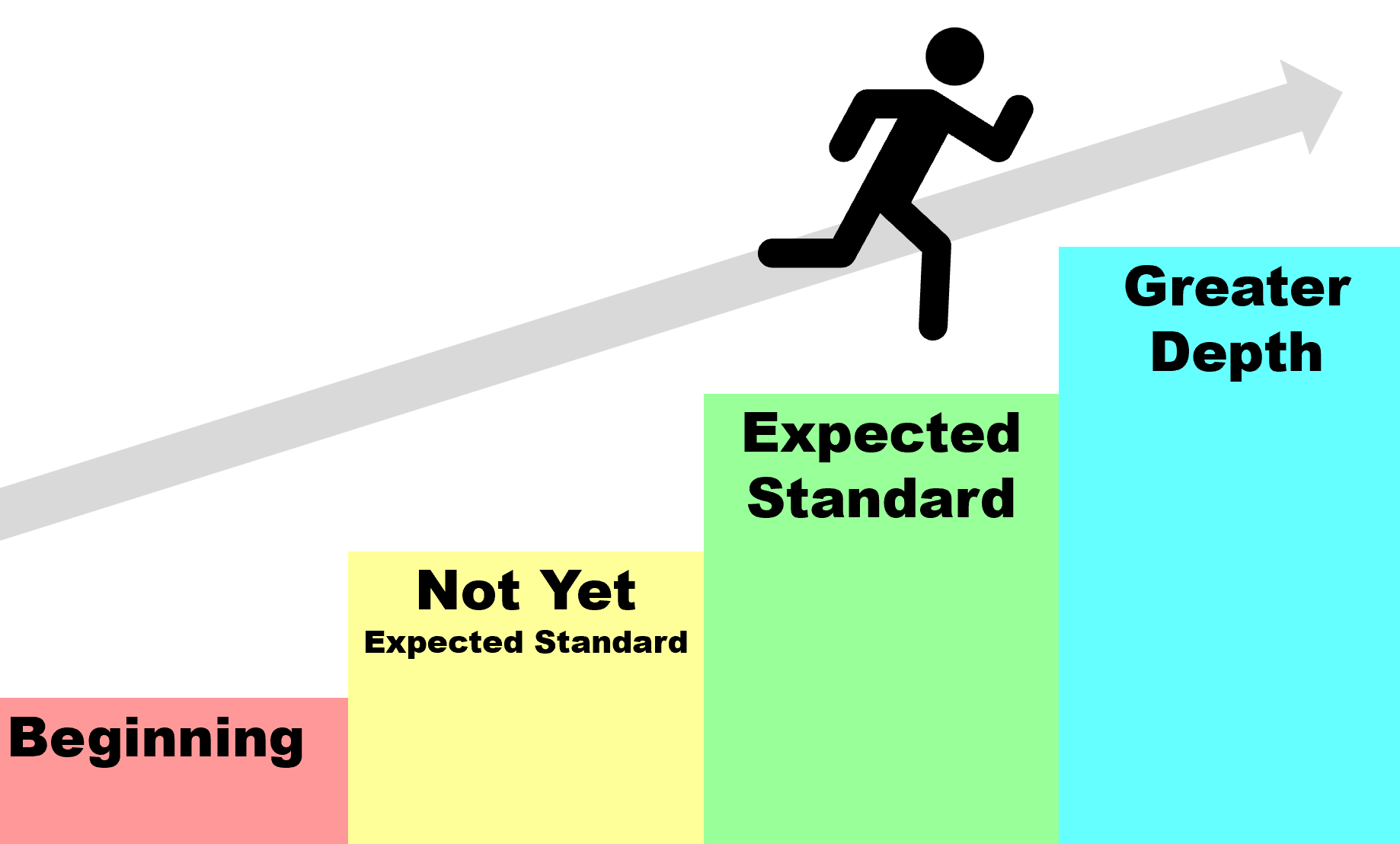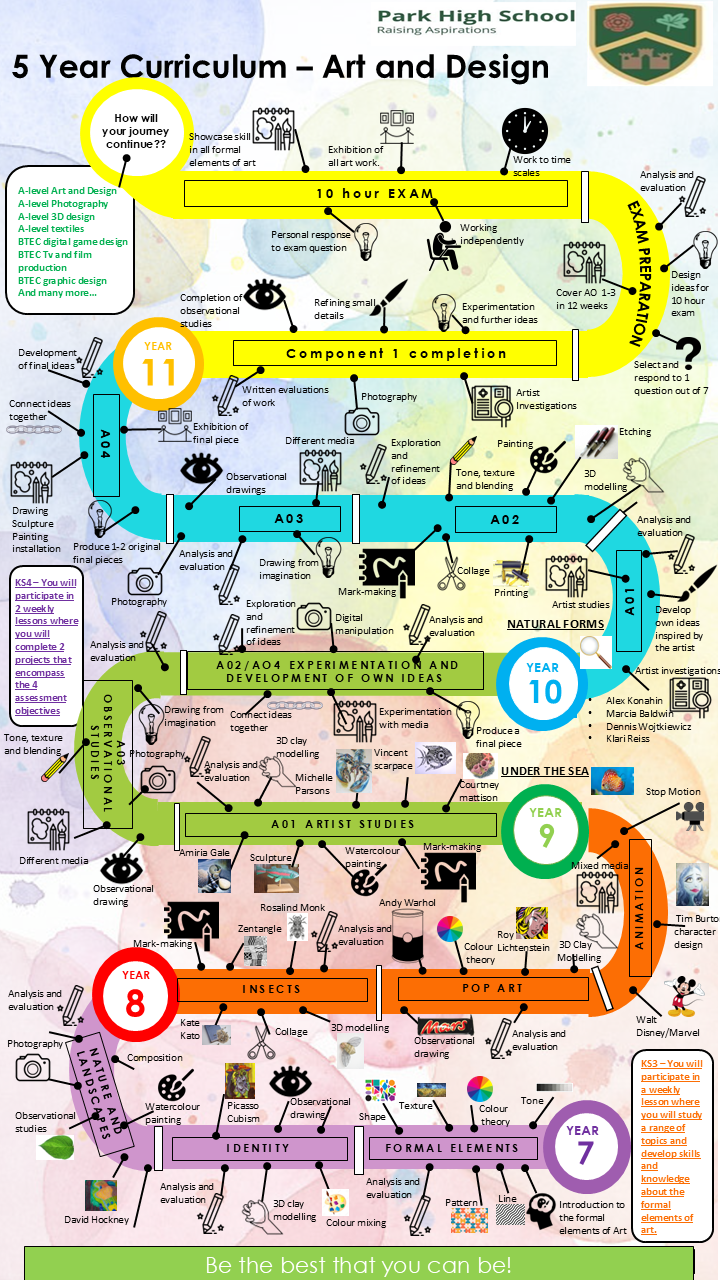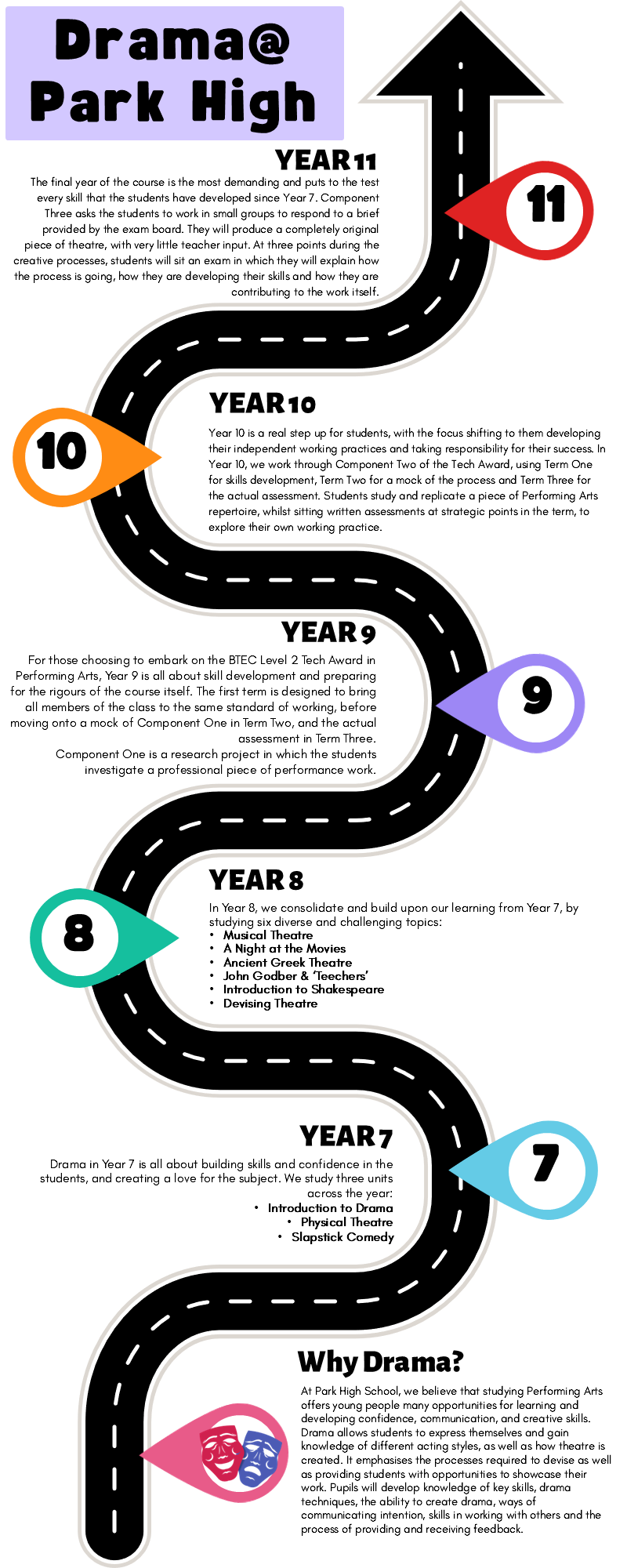Creative & Performing Arts
ASPIRE, PERFORM, ACHIEVE
Welcome to Park High school's Creative and Performing arts faculty where we ensure that all our pupils have an enjoyable and rewarding experience of Art, Drama and Music. We are committed to celebrating the creative achievements of our students and to guiding them as they develop their skills and practice ensuring they are equipped for higher education and post 16 courses. We have partnerships with both Nelson and Colne College and Burnley College whilst working closely with a variety of artists in residence.
Our school thrives through a community of students and teachers working closely together to ensure that all CPA students can work effectively to ‘Aspire, Perform and Achieve’.
Creative and Performing Arts plays a very important part of pupils enriched life at Park High School. We encourage all our students to embrace their creative, performing, and imaginative skills through a diverse cultural and artistic environment.
Our aim is to guide all our pupils to ‘aspire, perform and achieve’ through a love of learning experiences in CPA so that no one gets left behind. The pupil’s ideas and passion for the curriculum will in turn shape our school ethos and community.
We endeavour to challenge pupils with a rich curriculum that embeds understanding of local, National, and International cultures. Our curriculum is both ambitious and engaging.It allows pupils to think creatively and develop their long-term understanding and skills, whilst embedding subject knowledge.
We enable students to understand how to achieve and make greater progress through our personalised teaching and intervention strategies. Our aim is to deliver an enjoyable and rewarding programme of study in Creative and Performing arts which allows pupils to achieve their full potential and instil a confidence for their further learning post 16.
The CPA curriculum offers a clear and meaningful delivery of lessons to build on key skills, knowledge, and concepts. Teachers will use differentiation and literacy strategies to support all pupils despite their race, religion, social background, or culture to ensure they understand the purpose and nature of the lessons so that no one is left behind.
Art Learning Journey
Here at Park, we believe that creativity is a fundamental part of education and an important part of personal development. The Art department prides itself on making art meaningful, enjoyable, and accessible to all students whilst promoting the confidence and a desire in students to produce work of quality and meaning. Students are taught several art historic topics and movements while educating them on the formal elements of art, Students will explore and unpick creative skills and techniques from all angles of fine art drawing skills, sculpture making and challenge their ability to think creatively.
Extra Curricular Art Clubs are also offered weekly for the students to further develop their skills and give them a chance to learn new artistic skills that may not be taught during lesson time.
KS3 Purpose of study:
At this level of study Art is a requirement. Students are taught for 1 hour a week (1 lesson). Students will produce creative work, exploring their ideas and recording their experiences. Students will become proficient in drawing, painting, sculpture and other art, craft, and design techniques that will increase their proficiency in the handling of different materials. They will be able to evaluate and analyse creative works using the language of art, craft and design and create own personal opinions on their works and the work of others to allow them to develop and reflect on their studies by using a range of techniques to record their observations in sketchbooks, journals, and other media as a basis for exploring their ideas. Students will know and learn about great artists, craft makers and designers, and understand the historical and cultural development of their art forms and develop their own skills inspired by these artists through creating reflective artwork.
Assessment:
Judgements based on Curriculum Related Expectations (CREs)
Students are assessed formatively on a frequent basis to build reflexion and evaluation skills and to help build confidence in opinions of their own work. Students have summative assessments after each unit of work based on the skills they have acquired, and these assessed grades are then used to measure progression and development over time.
Judgements will be made by the Art teacher based on assessments and classwork on the progression in the curriculum at the end of the Autumn, Spring and Summer Term. Teachers will report home progression in the Art curriculum in terms of Beginning, Not Yet Expected Standard, working at the Expected Standard and working at Greater Depth.

Art Curriculum Related Expectations (CREs)
CRE 1 - Developing Skills in Drawing, Painting, and Sculpture by using a range of materials creatively (e.g. pencil, paint, clay, oil pastels).
CRE 2 - Begin to explore line, tone, texture, colour, pattern, form, shape, and space and to be able to use these successfully to develop an artwork.
CRE 3 - Exploring Ideas and Recording Experiences using a sketchbook to record observations, experiment with techniques and to show progress from initial ideas to finished artwork.
CRE 4 -Evaluate and analyse creative works using the language of art, craft and design by analysing and evaluating their own work, and that of others, to strengthen the visual impact or applications of their work.
CRE 5 - Learning About Artists, Designers, and Art Movements including different cultures, time periods and styles to develop an understanding of how context influences Art.
CRE 6 -Creativity and Personal Expression by providing opportunities for personal response and imaginative thinking.
Year 7 CREs
Autumn Term – “Formal Elements of Art” assessing - CRE 1, CRE 2, CRE 3, CRE 6
Spring Term – “Identity and Cubism” - assessing - CRE 1, CRE 2, CRE 3, CRE 4, CRE 5, CRE 6
Summer Term – “African Art” - assessing - CRE 1, CRE 2, CRE 3, CRE 4, CRE 5, CRE 6
Year 8 CREs
Autumn Term – “Insects” assessing CRE 1, CRE 2, CRE 3, CRE 4, CRE 5, CRE 6
Spring Term – “Pop Art” assessing CRE 1, CRE 2, CRE 3, CRE 4, CRE 5, CRE 6
Summer Term – “Animation and film” assessing CRE 1, CRE 2, CRE 3, CRE 4, CRE 5, CRE 6
KS4 Purpose of study:
Studying the AQA Fine Art Specification allows pupils to be introduced to a variety of experiences that explore a range of fine art media, processes, and techniques.
Students will explore the use of drawing for different purposes, using a variety of methods and media on a variety of scales. Students may use sketchbooks/workbooks/journals to underpin their work where appropriate.
Students will investigate relevant images, artists, artefacts, and resources relating to a range of art, craft and design and will respond to these through practical activities that demonstrate different styles, genres, and traditions.
In year 9 students will engage in a structured teacher led project. Students will refine skills and techniques acquired in key stage 3 but also develop new skills when experimenting with paint, printmaking, and mixed media techniques. Students will also explore the work of artists and learn how to analyse their work and produce work in response.
In year 10 students will explore the themes of close-ups and natural forms where they will be given more freedom to select and investigate sources that appeal to them.
Students are required to work in one or more area(s) of Fine art, such as
- Drawing and painting
- Mixed media, including collage and assemblage
- Sculpture
- Ceramics
- Installation
- Printmaking (relief, intaglio, screen processes and lithography)
- Photography
Assessment:
Component 1 – sustained project 60%
This will be completed in Years 10 and 11.
Component 2 – exam 40%
This will be given to pupils in January of Year 11 and will finish with a 10-hour exam.
Students will be assessed using four assessment objectives that will be demonstrated in the context of the content and skills presented within the sustained project and the exam. These are:
- Assessment Objective 1: Develop ideas through sustained and focused investigations informed by contextual and other sources, demonstrating analytical and critical understanding.
- Assessment Objective 2: Explore and select appropriate resources, media, materials, techniques, and processes, reviewing and refining ideas as work develops.
- Assessment Objective 3: Record ideas, observations, and insights relevant to intentions, reflecting critically on work and progress.
- Assessment Objective 4: Present a personal and meaningful response that realises intentions and, where appropriate, makes connections between visual and other elements.

Drama Learning Journey
KS3 Drama Purpose of study:
At Park High School, we believe that studying Performing Arts offers young people many opportunities for learning and developing confidence, communication, and creative skills.
Drama allows students to express themselves and gain knowledge of different acting styles, as well as how theatre is created. It emphasises the processes required to devise as well as providing students with opportunities to showcase their work. Pupils will develop knowledge of key skills, drama techniques, the ability to create drama, ways of communicating intention, skills in working with others and the process of providing and receiving feedback.
Assessment:
Judgements based on Curriculum Related Expectations (CREs)
Each unit is assessed through a variety of classwork tasks together with summative assessments at the end of the unit. The results of these assessments are reported home to parents via the termly student tracker.
Judgements will be made by the Drama teacher based on assessments and classwork on the progression in the curriculum at the end of the Autumn, Spring and Summer Term. Teachers will report home progression in the Drama curriculum in terms of Beginning, Not Yet Expected Standard, working at the Expected Standard and working at Greater Depth.

Drama Curriculum Related Expectations (CREs)
CRE 1 - Demonstrate confidence and focus in performance work.
CRE 2 - Collaborate effectively with others in a practical context.
CRE 3 - Apply physical and vocal acting skills with control and clarity.
CRE 4 - Create and sustain character using appropriate performance techniques.
CRE 5 - Respond to direction and feedback to improve performance.
CRE 6 - Perform with imagination and creativity using appropriate style and conventions.
Year 7 CREs
Autumn Term – “Physical Theatre” - Assessing - CRE 1, CRE 2, CRE 3, CRE 4
Spring Term – “Intro to Drama” - Assessing - CRE 1, CRE 2, CRE 3, CRE 4
Summer Term – “Slapstick Comedy” - Assessing - CRE 1, CRE 2, CRE 3, CRE 4, CRE 6
Year 8 CREs
Autumn Term – “A Night at the Movies” & “John Godber & ‘Teachers’” - Assessing - CRE 1, CRE 3, CRE 4, CRE 5
Spring Term – “Devising Theatre” & “Musical Theatre” - Assessing - CRE 1, CRE 2, CRE 3, CRE 6
Summer Term – “Greek Theatre” & “Introduction to Shakespeare” - Assessing - CRE 1, CRE 3, CRE 4, CRE 5
KS4 Drama
The Pearson BTEC Tech Award in Performing Arts course allows students to express themselves and gain knowledge of different acting styles, professional plays and the creative processes and approaches used to create theatre.
It breaks down the processes used by professional practitioners to devise as well as providing students with opportunities to showcase their own work. Pupils will develop knowledge of key skills and drama techniques specific to different acting styles, the ability to devise unique and inspiring drama, ways of communicating intention and purpose, skills in working collaboratively and independently and the process of analysing and evaluating their own and other work.
It is important to prepare students for the studying of the BTEC Tech Award in Performing Arts in order to provide them with a good understanding of the techniques and process that will be used along the way. The preparation for BTEC schemes of work have been designed tailored to the BTEC Tech Award criteria in order to support students understanding of how they will be graded. These schemes will be taught before students begin their study of the BTEC components.
The Pearson BTEC Tech Award in Performing Arts: Acting encourages students to:
- Actively engage in the processes of creating and performing your own and professional practitioner’s work.
- Develop skills within different acting styles such as Naturalism, Epic Theatre, Musical Theatre, Improvisation and Physical Theatre and apply these when reproducing professional repertoires.
- Identify and underpin the processes and approaches used by professional practitioners when creating professional work.
- Establish the key roles and responsibilities required creating professional work.
- Analyse and evaluate yours and others work.
Assessment:
Each unit is assessed through a variety of practical and written work.
- Developing Skills in Acting is assessed using the BTEC grading criteria for Component 2 and Techniques for devising is assessed using the learning outcomes for Component 3.
- Component 1 is internally assessed and is worth 30% of students’ overall grade.
- Component 2 is internally assessed and is worth 30% of students’ overall grade.
- Component 3 is externally assessed and is worth 40% of student’s overall grade.
The results of the internal assessments are tracked termly and are reported home to parents via the termly students’ tracker. There are no written examinations for BTEC Performing Arts. Summer tracker levels are based on student’s working grade dependent on the unit that they are working on.
Music Learning Journey
KS3 Music Purpose of study:
At Key stage 3, pupils study a broad, ambitious and inclusive music curriculum, rich in skills and knowledge, which ignites curiosity and prepares them well for future learning or employment. Our music curriculum gives pupils the opportunity to:
- Develop a thorough understanding of music, through listening, performing and composing.
- Develop self-confidence and gain a sense of achievement through performance.
- Encourage creativity through composition skills.
- Gain an understanding of SMSC through exposure to a wide range of musical genres from different historical times and cultural perspectives.
- Provide a holistic experience developing cross curricular life skills, such as confidence, perseverance, discipline, teamwork, problem-solving, time management, organisation and responsibility.
Assessment:
Judgements based on Curriculum Related Expectations (CREs)
Judgements will be made by the Music teacher based on assessments and classwork on the progression in the curriculum at the end of the Autumn, Spring and Summer Term. Teachers will report home progression in the Music curriculum in terms of Beginning, Not Yet Expected Standard, working at the Expected Standard and working at Greater Depth.

Music Curriculum Related Expectations (CREs)
CRE 1 - Play and perform confidently in a range of solo and ensemble contexts using their voice, playing instruments musically, fluently and with accuracy and expression.
CRE 2- Improvise and compose; and extend and develop musical ideas by drawing on a range of musical structures, styles, genres and traditions.
CRE 3 - Use staff and other relevant notations appropriately and accurately in a range of musical styles, genres and traditions.
CRE 4 - Identify and use the inter-related dimensions of music expressively and with increasing sophistication, including use of tonalities, different types of scales and other musical devices.
CRE 5 - Listen with increasing discrimination to a wide range of music from great composers and musicians.
CRE 6 - Develop a deepening understanding of the music that they perform and to which they listen, and its history.
Year 7 CREs
Autumn Term – “Elements of Music” - assessing - CRE 1, CRE 3, CRE 5
Spring Term – “Instruments of the Orchestra & “Structure” - assessing - CRE 1, CRE 2, CRE 5
Summer Term – “Pentatonic music from China” & “Riffs” - assessing - CRE 1, CRE 2, CRE 3, CRE 4
Year 8 CREs
Autumn Term – “Blues Music” & “Variations” - assessing - CRE 1, CRE 2, CRE 4, CRE 6
Spring Term – “Film Music” - assessing - CRE 1, CRE 2, CRE 3, CRE 5
Summer Term – “Reggae & music from the Caribbean” & “Pop Music” - assessing - CRE 1, CRE 5, CRE 6
KS4 Music Purpose of Study:
At Key Stage 4 we follow the AQA GCSE Music Specification.
The AQA GCSE aims to:
- Engage actively in the process of music study
- Develop performing skills individually and in groups to communicate musically with fluency and control of the resources used
- Develop composing skills to organise musical ideas and make use of appropriate resources
- Recognise links between the integrated activities of performing, composing and appraising and how these inform the development of music
- Broaden musical experience and interests, develop imagination and foster creativity
- Develop knowledge, understanding and skills needed to communicate effectively as musicians
- Develop awareness of a variety of instruments, styles and approaches to performing and composing
- Develop awareness of music technologies and their use in the creation and presentation of music
- Recognise contrasting genres, styles and traditions of music, and develop some awareness of musical chronology
- Develop as effective and independent learners with enquiring minds
- Reflect upon and evaluate their own and others’ music
- Engage with and appreciate the diverse heritage of music, in order to promote personal, social, intellectual and cultural development.
Exam Content:
Component 1: Understanding music – 40% of GCSE
Listening exam: 1 hour 30 minutes June Year 11.
Component 2: Performing - 30% of GCSE
Two vocal or instrumental performances internally assessed in Year 11.
Component 3: Composing music – 30% of GCSE
Pupils compose two pieces of music, one in Year 10 and one in Year 11 which are internally assessed.


